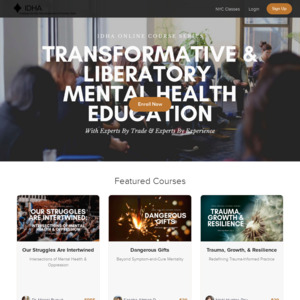Hey everyone, I found some great mental health courses that I've just signed up for, run by the Institute for the Development of Human Arts (IDHA), that I thought may be of interest to some of you. They're self-paced, online courses which you can access in entirety on any device, forever, once you're signed up.
They appealed to me due to my interst in critical theory, intersectionality, mad pride, mad studies, lived experience, & peer work. They'd be great for anyone working in mental health, or with an interest in that area, as well as for people with a lived experience of mental ill health, like me, or those who are interested in learning about it from outside of the medical model. If you're passionate about this sort of stuff, like I am, I'd love to connect to discuss this kind of stuff further!
But without further ado, here are the details of the courses:
- Our Struggles are Intertwined - Intersections of Mental Health & Oppression - free until the end of June (subsidized for those in need - they are making this course free through the month of June to support anti-racist work and education),
- The History of the Mad Movement & Alternatives to Biomedical Approaches - Learn About Transformative & Liberatory Mental Health Practices Beyond The Disease Model! - free
About Our Struggles are Intertwined - Intersections of Mental Health & Oppression, from the website:
“If you have come here to help me you are wasting your time, but if you have come because your liberation is bound up in mine, then let us work together.” - Lilla Watson
About the course:
Mental health and systemic oppression are deeply intertwined. From the pain of oppression being erased or made invisible due to the subjective nature of psychiatric diagnosis, to the significantly higher rates at which people of color are diagnosed with “serious mental illness,” to the subjective definition of psychological trauma, which still fails to include individual, collective, and generational trauma stemming from racism and institutionalized oppression.
The beginnings of the mad movement drew inspiration from other liberation movements of the time period, including the civil rights, women’s liberation, gay rights, and disabiltiy rights movements. Today, mental health activism is taking an increasingly intersectional approach, considering all points of oppression and a range of identities. In order to bring about real and lasting change in the system, this approach is crucial to integrate in training, research, clinical practice, and otherwise.
This class is for anyone interested in an intersectional analysis and holistic approach to healing.
It provides a historical analysis of how systems of oppression have impacted marginalized groups’ interactions with the mental health system. We begin by locating our identities and assumptions, then go on to contextualize the history of oppression and racism within the mental health system. We review a few of the ways that systemic oppression shows up in the system today, including the mental health disparities of BIPOC, the subjective nature of diagnosis, and oppression as an illness itself that is rarely seen as such. We close by invoking the peer movement as one place to seek liberation.
What you'll learn:
- How to locate yourself within social and political contexts, to spur reflection and future action
- The various, intersecting systems of oppression present in the United States
- How psychiatry as a discipline has been historically deployed to marginalize and oppress people of color, especialy BIPOC
- The influence of race and ethnicity on mental health diagnosis
- The importance of an intersectional approach to making change in the mental health system
- How the peer movement can support collective liberation
Your Instructors:
Dr. Mariel Buquè & Noah Gokul
Dr. Mariel Buquè is an Afro-Dominican with a Ph.D. in Counseling Psychology from Columbia University. Her work focuses on the advancement of culturally responsive clinical care and healing wounds of intergenerational trauma. She teaches courses and provides clinical care at Columbia University in the areas of culturally-responsive delivery of mental health care and the decolonization of eurocentric therapeutic practices. She also focuses on delivering racial healing workshops and conducting mental health and anti-racism workshops across the nation, as she believes in the liberation of our minds and of oppressive systems as necessary qualities of our overall wellness.
Noah Gokul is a queer educator, artist, musician from Oakland, CA. He identifies as a trauma survivor, and has used music for personal healing and for the healing of others, as a Peer Specialist working with young adults. He currently is a consultant for COR (Confronting Structural Racism) program in the Jewish Board, organizing programming for an agency wide anti-racism initiative. He strongly believes in reimagining what we call “mental health,” through a holistic lens rooted in an anti-oppression framework.
“This has been the best training in mental health that I’ve attended; very grateful to IDHA and presenters.” ~ 2020 Course Participant
Course curriculum:
Introduction
* Intro To IDHA & The School For Transformative Mental Health (6:40)
* What Brings You To The Work? (8:58)Locating Our Identities & Assumptions
* Focusing on Racism As Oppression (5:47)
* Our Multiple Identities (8:01)
* Your Impressions on The Institution of Mental Health (6:40)Historical Contextualizing
* The History of Racism in Mental Health (10:14)
* The Exploitation of BIPOC (7:03)Mental Health & Systemic Oppression
* Mental Health Disparities of BIPOC (10:53)
* Mental Health Diagnoses & Race (11:56)
* Oppression As The Illness (9:58)The Peer Movement & Liberation
* Black/African Centered Psychology (3:43)
* Peer Movement Culture (5:31)
* Liberating Minds (4:35)What you get:
- 120+ minutes of video content
- Exclusive readings and resources
- Access to the IDHA Learning Community Facebook Group
- Discussion with community members inside the course
This course is for:
- Mental health and physical health professionals, including: clinicians, psychologists, psychiatrists, social workers, peer specialists, recovery support specialists, housing specialists, nurse practitioners, wellness support workers, coaches, holistic practitione
- Students
- Activists
- Family members and advocates
- Anyone who works or plans to work with people experiencing mental health-related challenges
About The History of the Mad Movement & Alternatives to Biomedical Approaches - Learn About Transformative & Liberatory Mental Health Practices Beyond The Disease Model!, from the website:
An introductory course for mental health practictioners and advocates who want to gain knowledge about alternative practices and become change makers in their field.
Why you're here:
- You know mental health in the U.S. is in need of reform and want to be part of the solution.
- You believe people should not be reduced to their medical diagnosis but don't know where to get information about alternatives.
- You are frustrated by a mental health system that hinders people from living full lives and you constantly think to yourself "there has to be another way!"
- You know there are numerous other factors that impact our mental health such as trauma, poverty, and race—and you want to know more.
- You seek refreshing perspectives about mental health that go beyond our “medicate and separate” institutional model and truly transform lives.
- You want to make a difference in the lives of those with mental health-related challenges.
You've asked all the right questions:
How did we get here?
We review the political and social landscape that bolstered the dominant biopsychiatry model from the 1980s until now.What's the problem with mental health right now?
We discuss the widespread impacts of big pharma, the marketing of psychotropic medication, and subsequent cultural reforms that shifted us into an age of more "sickness" than ever before.Where's the resistance?
We provide a brief history of the mad movement and human rights reform in mental healthWhat about the people who have been through it?
We uplift the power of lived experience, amplify the voices of survivors of trauma and adversity, discuss the rise of the peer specialist role, and reform the system with the power of our stories.What's the alternative?
We introduce innovative and transformative alternative frameworks for understanding mental health and well-being.Who this course is for:
- Health and mental health professionals, including: clinicians, psychologists, psychiatrists, social workers, peer specialists, recovery support specialists, housing specialists, nurse practitioners
- Students
- Family members and advocates
- Activists
- Anyone who works or plans to work with people experiencing mental health-related challenges
IDHA's unique approach to learning:
We value lived experience as highly as professional training, so each of our courses is led by both a mental health clinician as well as a someone who identifies as a survivor, a mental health service user, and/or someone who has experienced a mental health crisis. This means you will receive holistic and nuanced perspectives from experts by trade and experts by experience.
Meet your instructors:
Celia Brown
President of Mind Freedom International
Regional Advocacy Specialist for the New York State Office of Mental HealthJonah Bossewitch, Ph.D
Educator, Technologist, Activist
Director of Software Architecture and Applications for Vibrant Emotional HealthSascha DuBrul, MSW
Writer, Educator, Co-Founder of the Icarus Project
Recovery Specialist and Trainer for OnTrackNYIssa Ibrahim
Artist, Activist
Author of The Hospital Always WinsJazmine Russell, NYCPS
Holistic Counselor, Peer Specialist
Co-Founder of IDHABradley Lewis, MD, PhD
Author, Practicing Psychiatrist
Associate Professor at New York University’s Gallatin School of Individualized StudyCourse curriculum:
Welcome - Start Here!
* Introduction to IDHA + Course Overview (2:30)Biomedicalization & Institutionalization
* A Conversation on the History of Biomedical Approaches with Sascha DuBrul & Issa Ibrahim (12:48)
* Bonus: Unraveling the Biopsychiatric KnotThe Resistance, Research, & Big Pharma
* Part 1: The Mad Underground: A New Wave of Mad Resistance with Jonah Bossewitch (11:46)
* Part 2: Mad Science: The Impact of Big Pharma & The Future of Surveillance Psychiatry with Jonah Bossewitch (12:31)The Value of Lived Experience: The Peer Movement & The Peer Workforce
* The History of the Peer Movement with Celia Brown (11:30)
* Bonus: Peer Workers in the Mental Health SystemThe Mental Health System & Systemic Injustice
* Navigating Unjust Systems as a Mental Health Worker with Jazmine Russell (11:21)Alternative Models for Understanding Mental Health
* Narrating Mental Difference: Mad Studies, Mad Resistance, and Alternative Models with Brad Lewis (19:49)
* Bonus: Mad Resistance/Mad AlternativesWhat you get:
- 7 videos full of history, research, and unique perspectives
- 3 bonus articles written by our faculty and other leaders in the field
- Access to a creative online community of professionals and advocates



Sounds like somebody needs to do the unit on paranoia and victim mentality.